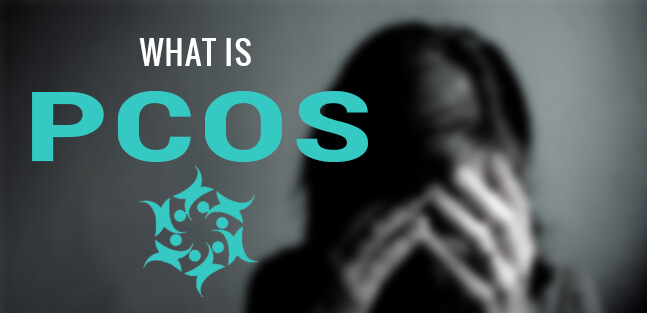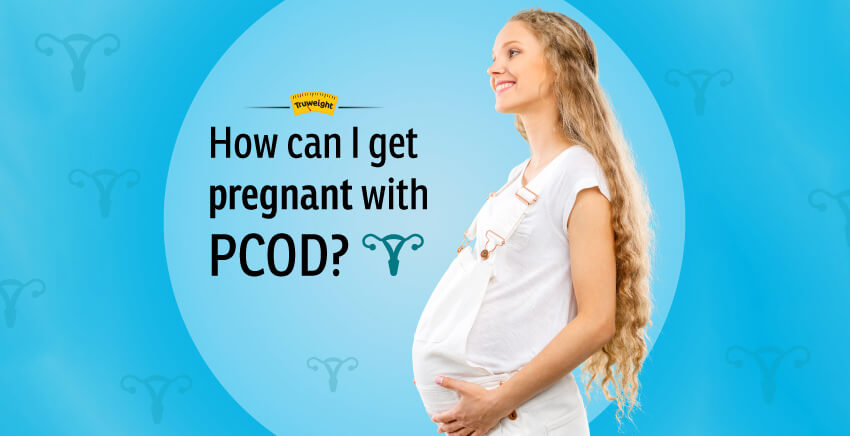Medically reviewed by Dr. Shunmukha Priya, Ph.D. in Food Science and Nutrition
Polycystic Ovary Syndrome (PCOS) is a medical condition affecting women whose hormone patterns are altered with higher than normal production of Androgen which is a male sex hormone.
Table of Content
- What is PCOD?
- PCOS symptoms
- When to see a doctor?
- Diagnosis of PCOS
- PCOS and pregnancy
- Control of PCOD
- PCOS – how to get pregnant quickly
- Natural ways to cure PCOS
This imbalance causes irregular menstrual cycles in women making it difficult for them to conceive. PCOS remains one of the primary causes of infertility among women. But this does not mean that one cannot conceive. When the condition and symptoms improve, a woman can get pregnant with PCOS.
Here we bring you some treatment options and natural ways to treat PCOS. Following these will help you conceive.
What is PCOS?
Polycystic Ovary Syndrome (PCOS) is a set of symptoms characterised by an elevated level of male hormones called Androgens in childbearing women (aged between 18 and 44 years).

Generally, in every woman, a small amount of male hormones called Androgen is produced. But, if the male hormone is produced in excess, the release of an egg or ovulation becomes irregular. This irregular ovulation causes irregular menstrual cycles.[1]
Polycystic Ovary Syndrome Symptoms:
The pronounced signs and symptoms of PCOS are indicated by::
- The irregularity of the menstrual cycle or absence of it
- Heavy or profuse bleeding during periods
- Hirsuteness
- Blackheads, or whiteheads, pimples and oily skin
- Pain originating in the pelvic region
- Conception becomes difficult
- Patches of thick, dark and velvety skin[2]
The conditions associated with PCOS are:
- Imbalance in blood sugar levels
- Unexplained weight gain
- Disturbed sleep pattern with excessive snoring
- Erratic behavioural pattern
- Cardiac ailments
- Cancer caused in the lining of the uterus[3]
When to see a doctor?
A visit to your doctor is warranted if you are unable to explain the following conditions:
- Diabetes or blurred vision and sudden loss or gain of weight
- Repeated conception failure
- Absent menstruation even though there is no pregnancy
- Unusual presence of hair
Diagnosis of PCOS:
A visit to your doctor may reveal the presence of this disease if you have:
- High Androgen level
- Irregular menstrual cycle
- Cyst In the ovary
Your doctor will further look for other tell-tale indicators in the form of facial hirsuteness, unexplained weight gain and acne. Further examinations by your doctor may be necessary to finally diagnose the existence of PCOS.[4]
The condition can be diagnosed using,
- Pelvic examination
- Blood tests
- Ultrasound imaging
PCOS and pregnancy:
Infertility in women is majorly caused by PCOS. Because of the irregular menstrual cycle, it becomes harder for women to conceive. Between 70 to 80% of women suffering from PCOS have problems with fertility.
Even if you conceive, you are likely to face complications and difficult confinement that may result in premature birth or miscarriage. You are also likely to suffer from hypertension and gestational diabetes.
How to Control PCOS:
While there is no proper cure for this condition, the question is how to get pregnant with PCOS. Available fertility treatments improve ovulation in women with PCOS, which ultimately helps them to get pregnant.

Some of the natural ways to control PCOS are eating a low carbohydrate diet, indulging in regular exercise and maintaining a healthy lifestyle.
This will help you to reduce your weight, control your blood sugar to a reasonably low level and increase your odds of having healthy confinement.
PCOS – how to get pregnant quickly:
The question of how to get pregnant with PCOS must be haunting a large number of women who suffer from infertility due to it. But you can still get pregnant thanks to the available treatments.
The two popular fertility treatments are:
Intrauterine Insemination (IUI) – A healthy sperm is directly inserted into the uterus while ovulating.
In-vitro Fertilisation (IVF) – Eggs taken from the ovaries are fertilised in a lab by sperm. Once the embryo develops, the doctor puts the developed embryo into the uterus.
With a combination of fertility treatments and lifestyle adjustments, most women with PCOS can get pregnant. A great majority of women can successfully conceive with the help of lower-tech fertility treatments while some may need IVF. But it is best to explore the natural ways to overcome the hindrance.[5]
Natural ways to cure PCOS:
The natural ways to cure PCOS involves lifestyle changes and other means like weight loss and suitable dietary adjustments.
1. Weight loss:
One of the main causes of polycystic ovaries pregnancy failure is because overweight women do not ovulate regularly. Losing weight is effective to start ovulation and in turn, shall help you to conceive.
2. Maintain a healthy weight:
It is important to maintain a healthy weight to check insulin resistance. This will also regulate your period for getting pregnant with PCOS.[6]
3. Dietary adjustments:
One of the most important ways to treat PCOS is by eating a healthy balanced diet. It helps you to attain a healthy weight and restore the hormonal balance that will not only increase ovulation but also keep a check on your sugar levels.
You have to ensure that your food is rich in nutrients with adequate proteins and is low on sugar and refined carbs. You must also embrace healthy food habits. It will help you to regulate your hormones and menstrual cycle.[7]
A possible diet chart must have the following:
- Eat a heavy breakfast and a light dinner.
- Include protein-rich foods such as, whole legumes, sprouts and greens.
- Eat one serving of fruits (preferably whole fruit) and two servings of vegetables (as salad or soup).
- Have carbohydrates like whole grains and millets.
- Include food with healthy fats such as monounsaturated fats (MUFA) found in nuts, avocado, vegetable oils and polyunsaturated fats (PUFA) available in seafood and some vegetable oils.
- Eat anti-inflammatory foods like tomatoes, leafy greens, Mackerel and Tuna.
- Eating iron-rich foods like spinach, eggs and broccoli control iron deficiency and anaemia.
- Cut out excessive drinking of coffee and tea.
- Natural supplements like cinnamon, chamomile, liquorice, basil or tulsi have a beneficial effect on you and can ease the effects of PCOS.
4. Physical activity:
Light exercises such as aerobics and some yoga are ideal for women to get pregnant with PCOS and also a good way to maintain a healthy weight.
Running and swimming will also control PCOS. However, you should not indulge in heavy exercises, and a balanced approach is important in terms of exercise for women suffering from PCOS to get pregnant.
5. Lifestyle adjustments:
- The level of Cortisol is regulated by your sleep pattern. To maintain sleep hygiene you must sleep a minimum of 7 to 8 hours a day with a regular bedtime routine.
- Reducing stress regulates Cortisol. Practice meditation to ease your stress.
Severe disruption of your menstrual cycle makes it extremely difficult to get pregnant with PCOS. To deal with PCOS, you need to adopt a well balanced PCOS diet and lifestyle changes to achieve your goal, along with mild exercise routine. [8]
The Possible Model
Possible strongly believes that a healthy and nutrient-dense diet is the key to overcoming several lifestyle-related diseases. And the results of our recent publishing only strengthened this conviction.
We had recently published a research paper on PCOS in International Journal of Food Science and Nutrition. The research was conducted on our PCOS clients (aged between 17 and 40) who had a BMI above 30. The clients’ progress was observed for 6 months and were recorded.[9]
Maintaining a healthy weight is the first recommendation for managing PCOS. The study was conducted to observe how weight loss and management through the Possible program help relieve the symptoms of PCOS.
The clients of the study were enrolled online; under the Possible health program.
After enrolment, they were given consultation through phone weekly. Food kits from Possible were given monthly once. Our food kit is loaded with superfoods that are high in fibre, protein, complex carbohydrates and healthy fats.
Each client was given a personal nutritionist. The nutritionists guided the clients on diet, physical activities and also monitored the progress of clients’ weight loss. Nutritionists connected with clients over the phone every week.
The Ayurveda in-house physicians used to check for sugar updates once a month. Clients who were on medication for PCOS were asked to continue the same.
The results revealed a significant reduction in BMI after following the Possible program. Participants lost 8- 20% of their initial body weight. The result also showed an improvement in major PCOS symptoms like irregular periods, facial hair and acne.
The outcome proved that the mean intake of macronutrients like carbohydrates (154.3g), fat (25g) and protein (46.2g) has a positive effect on weight loss.
The study concluded that diet plays a significant role in reducing BMI and improving PCOS and symptoms related to it.
Conclusion
The first step towards getting pregnant with PCOS is to control and overcome the condition. And once you overcome, it is crucial to maintain it that way to avoid recurrences since there is no cure for PCOS, only effective management.
Before going for hi-tech fertility treatments, controlling PCOS using natural methods like healthy eating and exercising can boost the chances of pregnancy.
Load up on vegetables, fruits, nuts and lean meat. Eat a low-carb diet and exercise 4 to 5 times a week. These are not only inexpensive but also effective in controlling PCOS.

I have had irregular periods for a while now and remember getting a diagnostic test for PCOS done a few years ago. I remember my gynaecologist recommending exercise and a diet filled with nutrients. Exercise has helped me a bit with regulating the menstrual cycle.
Dear Meera, We’re glad to receive your compliments and appreciation towards our blog. We are happy to know that our blog was very useful to you . Keep following our blog to know such more health information.